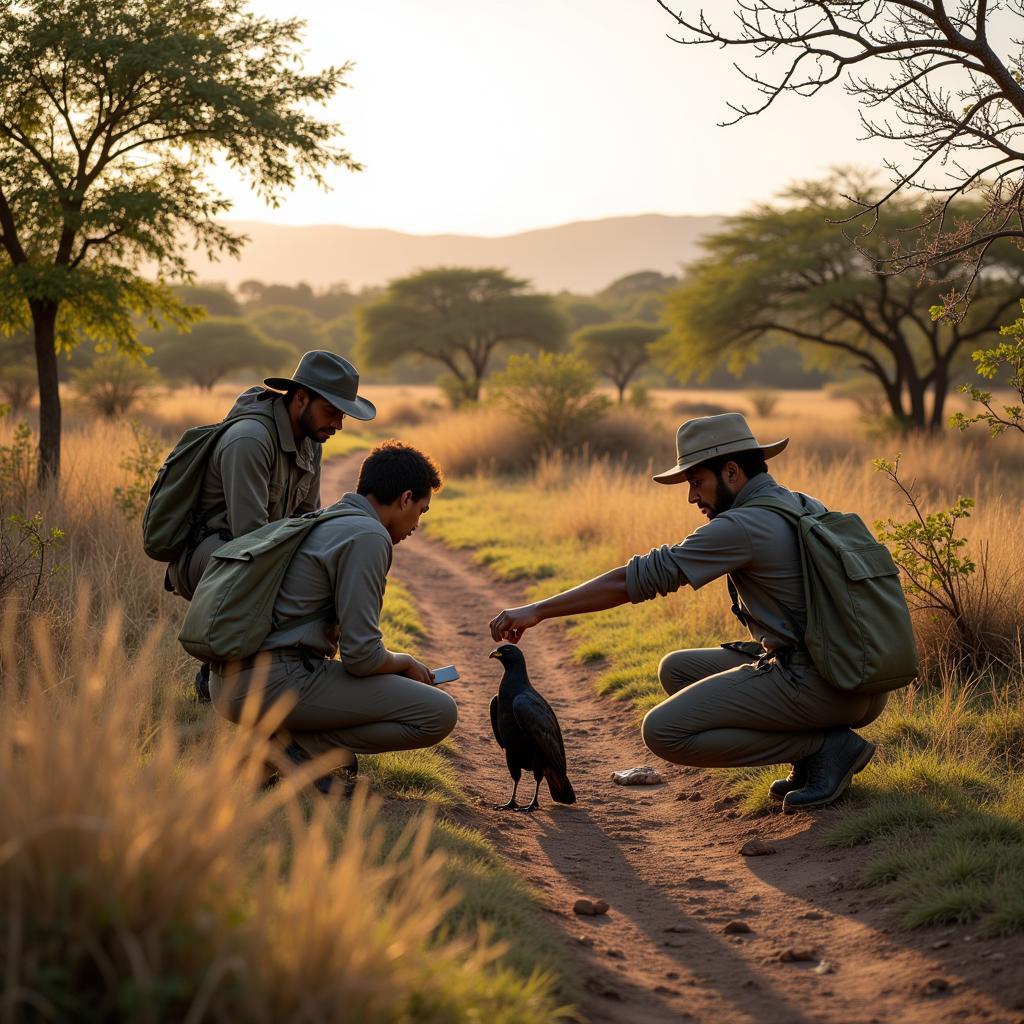Journey into the Heart of Darkness: Unveiling the African Forest Elephant in the Congo Rainforest
The African forest elephant, a denizen of the dense Congo rainforest, remains shrouded in mystery. These elusive giants, distinct from their savanna counterparts, play a crucial role in maintaining the ecological balance of this vital ecosystem.
Silent Guardians: The Vital Role of Forest Elephants
 African forest elephant navigating the Congo rainforest
African forest elephant navigating the Congo rainforest
Forest elephants are true ecosystem engineers, shaping their environment in profound ways. Their foraging habits, which involve consuming vast quantities of vegetation and creating clearings in the dense undergrowth, promote plant diversity and create habitats for other species. Their dung, rich in nutrients, acts as a natural fertilizer, dispersing seeds across the forest floor. This intricate dance between elephant and environment highlights their crucial role in maintaining the health and biodiversity of the Congo Basin.
A World Apart: Distinguishing Features and Adaptations
The African forest elephant, smaller in stature than its savanna relative, boasts a unique set of adaptations perfectly suited for life in the dense rainforest. Their darker pigmentation provides camouflage amidst the dappled sunlight filtering through the canopy. Smaller, rounded ears minimize heat loss in the humid environment, while their straight, downward-pointing tusks, adapted for maneuvering through dense vegetation, serve as tools for foraging and clearing paths.
Facing the Shadows: Threats to a Fragile Giant
 African forest elephant threatened by poaching
African forest elephant threatened by poaching
Despite their vital role, African forest elephants face a perilous future. Poaching, driven by the illegal ivory trade, has decimated their populations. Habitat loss and fragmentation, driven by deforestation for agriculture, logging, and mining, further isolate and endanger these already vulnerable creatures.
A Glimmer of Hope: Conservation Efforts and the Future
Recognizing the urgency of the situation, conservation organizations, governments, and local communities are joining forces to safeguard the future of the African forest elephant. Anti-poaching patrols, habitat restoration initiatives, and community-based conservation programs offer a beacon of hope for these magnificent creatures.
Unraveling the Mysteries: Research and the Quest for Knowledge
Scientific research plays a vital role in understanding the complex ecology of the Congo rainforest and the critical role of forest elephants. By studying their behavior, movements, and interactions with the environment, researchers gain invaluable insights that inform conservation strategies and contribute to the long-term survival of these gentle giants.
Conclusion
The African forest elephant, an integral thread in the tapestry of the Congo rainforest, stands as a symbol of the interconnectedness of life on Earth. Protecting these magnificent creatures requires a concerted effort to address the threats they face, ensuring that future generations can marvel at their presence in the heart of Africa.
FAQs
1. What is the difference between African forest elephants and African bush elephants?
African forest elephants are smaller, have straighter tusks, and rounder ears compared to their savanna-dwelling counterparts.
2. Why are African forest elephants important to the Congo rainforest?
Their foraging and movement patterns create habitats and disperse seeds, promoting plant diversity and maintaining the health of the ecosystem.
3. What are the main threats to African forest elephants?
Poaching for ivory and habitat loss due to deforestation are the most significant threats to their survival.
4. How can I help protect African forest elephants?
You can support reputable conservation organizations working in the region, raise awareness about their plight, and advocate for responsible consumption choices that do not contribute to deforestation.
5. Where can I learn more about African forest elephants?
For further insights, you can explore resources from organizations like the Wildlife Conservation Society and the World Wildlife Fund, as well as scientific publications on elephant ecology and conservation.
Need More Information?
If you have any more questions or need further assistance, please don’t hesitate to contact us.
Phone: +255768904061
Email: kaka.mag@gmail.com
Address: Mbarali DC Mawindi, Kangaga, Tanzania
Our dedicated customer support team is available 24/7 to assist you.

